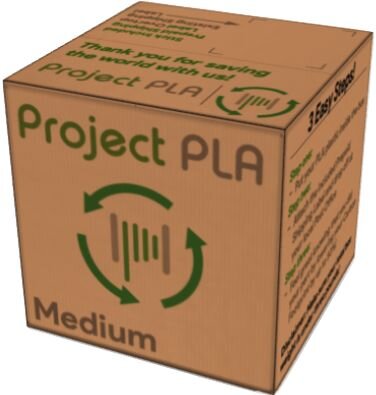![Project PLA will recycle your 3D printing scraps [Source: Project PLA]](https://fabbaloo.com/wp-content/uploads/2020/05/image-asset_img_5eb08ba343b34.jpg)
A non-profit company hopes to solve the issue of accumulated 3D printing waste through a recycling program.
The venture is called “Project PLA”, started by William Sloth, a high school junior based in Rochester.
PLA Scraps
![A box of 3D printed scraps like this is beside every 3D printer [Source: Fabbaloo]](https://fabbaloo.com/wp-content/uploads/2020/05/image-asset_img_5eb08ba38d2c3.jpg)
What is being solved here? It’s the problem of plastic scrap. Anyone who operates a 3D print will have an enormous amount of scraps leftover from 3D printing activity. These scraps could be support structures removed from a successful 3D print, or perhaps a failed 3D print. Or an early iteration on a prototype being developed that wasn’t quite right. Or extruded material wiped from the nozzle. Or snipped off filament tips. Or, well, you get the idea. Where there’s filament, there are scraps.
PLA Recycling Problems
While PLA is touted as being biodegradable and recyclable, in practice it isn’t so easy. Sloth wanted to recycle his scraps, but found that his local recycling operation would not accept the PLA materials, as they were of a type not processed. Further research indicated only industrial-level recycling processes could handle this type of plastic, and even worse, there were only just over a hundred such operations in the US. Many countries will have limited capabilities to perform this type of recycling.
And if it could not get even more complex, it turns out that the few operations that do accept PLA, for example, will require it delivered in industrial-sized quantities. None would accept a shoebox of scraps, as most desktop 3D printer operators would produce.
Sloth sought a solution by combining everyone’s scraps together. His venture, Project PLA, will accept PLA scraps and accumulate them until a sufficient quantity is on hand to deliver to a proper recycling facility. He explains:
“I did many hours of research to find facilities that actually compost PLA plastic. I am currently in contact with several and am running tests with each. Unfortunately, these facilities only take industrial waste, not residential, so they wouldn’t be an option for the average person.
To solve this problem I decided to create a company called Project PLA, which collects plastic from makers around the United States on an industrial scale. Project PLA is the middleman that connects makers with industrial composting facilities, therefore enabling PLA to be actually biodegradable! Our process is simple: you mail in your PLA to us and we send it to the composting facility! It’s that easy to compost your PLA!”
Project PLA Process
Here’s how it works: you order an empty box from Project PLA of a size to match your scrap pile. Your payment for the box will cover not only the cost of the box, but also the shipping to and from you, as well as the process of recycling the plastic.
Project PLA offers several different box sizes, ranging from the 8” x 8” x 8” (20cm^3) to the large 20” x 20” x 20” (50cm^3). The boxes are priced to account for a full box of scraps for each size.
There is also an option to simply ship them scrap by weight, as a cost of US$3.49 per pound (US$7.68 per kg).
This is certainly a feasible way to properly dispose of PLA scraps, which otherwise will likely end up in a local landfill. Sure, they will eventually degrade in the landfill, but it will take decades for that to happen. Meanwhile, the material could have been recycled to produce new filament or other plastic products.
3D Print Recycling
The question I have is whether the target market here is willing to explicitly spend money for recycling. While most urban areas have recycling programs available, they are effectively free to use and that’s why many people use them. The idea of paying for recycling — and spending the effort to order, box up and ship your scraps might be too much for many desktop 3D printer operators, who are notoriously frugal when it comes to spending.
I have a suspicion that alternative recycling schemes may be more effective such as RE PET 3D, who pull selected material from a collection agency, or RePLAy 3D, who provide a return box for scraps when you buy a spool of filament, or even 3DEVO’s filament production device, which will directly reuse scraps without any shipping at all.
Via Project PLA


1 comment
Comments are closed.